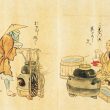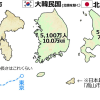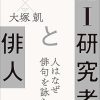ペストの流行 歴史は後から作られる例
公開日:
:
最終更新日:2018/01/17
観光資源
BBCを聴く。中世の黒死病、ペストの流行はネズミによるものだと、学校で教えられたはずだが、残存するデータを基にシミュレーションしてみると、人間の蚤、虱が媒介していたということが明らかになったようだ。これも歴史は後から作られる典型であろう。
ウィキペディアには「ペストは元々齧歯類(特にクマネズミ)に流行した病気で、人間に先立ってネズミなどの間に流行が見られることが多い。」と記述されている(2018年1月16日)。こうなるとウィキペディアも良し悪しになってしまう。
http://www.bbc.com/news/science-environment-42690577
Rats were not to blame for the spread of plague during the Black Death, according to a study.
The rodents and their fleas were thought to have spread a series of outbreaks in 14th-19th Century Europe.
But a team from the universities of Oslo and Ferrara now says the first, the Black Death, can be “largely ascribed to human fleas and body lice”.
The study, in the Proceedings of the National Academy of Science, uses records of its pattern and scale.
The Black Death claimed an estimated 25 million lives, more than a third of Europe’s population, between 1347 and 1351.
“We have good mortality data from outbreaks in nine cities in Europe,” Prof Nils Stenseth, from the University of Oslo, told BBC News.
“So we could construct models of the disease dynamics [there].”
He and his colleagues then simulated disease outbreaks in each of these cities, creating three models where the disease was spread by:
rats
airborne transmission
fleas and lice that live on humans and their clothes
In seven out of the nine cities studied, the “human parasite model” was a much better match for the pattern of the outbreak.
It mirrored how quickly it spread and how many people it affected.
“The conclusion was very clear,” said Prof Stenseth. “The lice model fits best.”
“It would be unlikely to spread as fast as it did if it was transmitted by rats.
“It would have to go through this extra loop of the rats, rather than being spread from person to person.”
‘Stay at home’
Prof Stenseth said the study was primarily of historical interest – using modern understanding of disease to unpick what had happened during one of the most devastating pandemics in human history.
But, he pointed out, “understanding as much as possible about what goes on during an epidemic is always good if you are to reduce mortality [in the future]”.
Plague is still endemic in some countries of Asia, Africa and the Americas, where it persists in “reservoirs” of infected rodents.
According to the World Health Organization, from 2010 to 2015 there were 3,248 cases reported worldwide, including 584 deaths.
And, in 2001, a study that decoded the plague genome used a bacterium that had come from a vet in the US who had died in 1992 after a plague-infested cat sneezed on him as he had been trying to rescue it from underneath a house.
“Our study suggests that to prevent future spread hygiene is most important,” said Prof Stenseth.
“It also suggests that if you’re ill, you shouldn’t come into contact with too many people. So if you’re sick, stay at home.”
関連記事
-

-
小川剛生著『兼好法師』中公新書 安藤雄一郎著『幕末維新消された歴史』日本経済新聞社
『兼好法師』 現在広く知られている兼好法師の出自や経歴は、没後に捏造されたもの。 一世紀を経
-

-
『素顔の孫文―国父になった大ぼら吹き』 横山宏章著 を読んで、歴史認識を観光資源する材料を考える
岩波書店にしては珍しいタイトル。著者は「後記」で、「正直な話、中国や日本で、革命の偉人として、孫文が
-

-
『動物の解放』ピーターシンガー著、戸田清訳
工場式畜産 と殺工場 https://www.nicovideo.jp/watch
-

-
プロテスタンティズムと現代政治 学士會会報NO.927 2017年Ⅵ 深井智朗 pp24-27
マルティン・ルターによる神聖ローマ帝国の宗教の改革は、彼の意図に反して、すぐに政治化し、彼の死後まも
-

-
本当に日本は職人を尊ぶ国であったのか?
司馬遼太郎氏は、韓国、中国との比較においてなのか、『この国のかたち』のなかで、「職人。実に響きがよ
-

-
観光資源としての明治維新
NHKの大河ドラマは、源平合戦、関ケ原の戦い、明治維新が三大テーマのように思うが、観光資源としての価
-

-
🌍🎒シニアバックパッカーの旅 動画で見る世界人流観光施策風土記 モンゴル紀行 メモ書き シャーマン動画 トナカイ解体動画
ツァータン族の居住地の4泊分は、通訳代、移動費を別にして、180万ツグルであった。 ツァーマン
-

-
仏フォアグラ生産者が米加州の禁止措置に反発、人道的飼育を主張 「観光資源フォアグラと動物愛護」の教材
世界のこぼれ話2019年1月18日 / 11:26 / 3日前 [モ
-

-
🌍👜シニアバックパッカーの旅 11月18日午後 ハルピンの安重根記念館 サンフランシスコのForgotten Camp
動画 https://www.facebook.com/shuichi.teramae/video
-

-
『サカナとヤクザ』鈴木智彦著 食と観光、フードツーリズム研究者に求められる視点
築地市場から密漁団まで、決死の潜入ルポ! アワビもウナギもカニも、日本人の口にしている大
- PREV
- 観光資源としての明治維新
- NEXT
- 『外国人労働者をどう受け入れるか』NHK取材班を読んで



